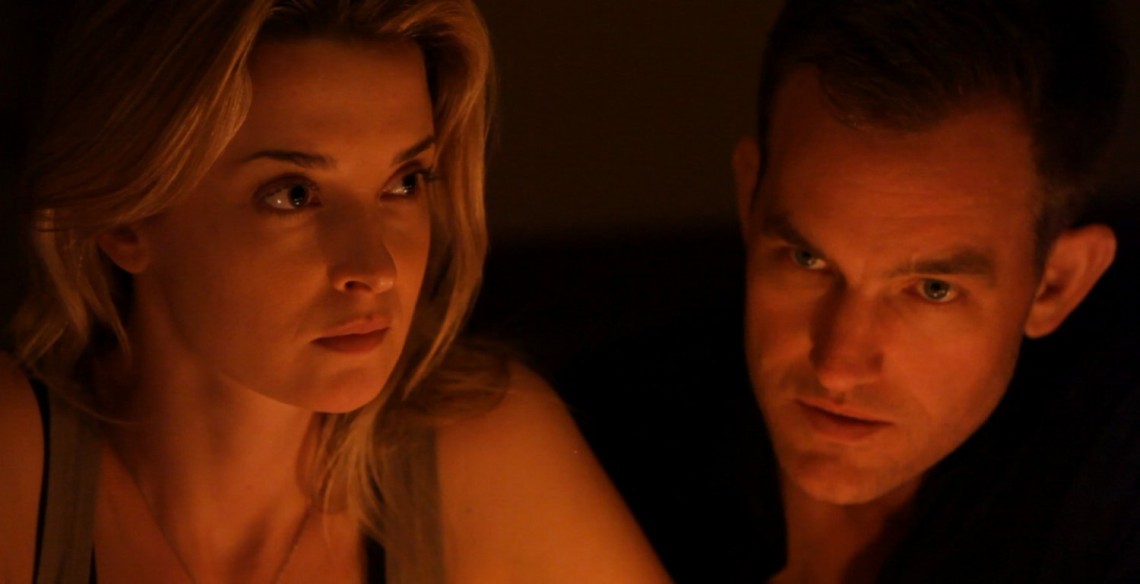Coherence is a heady, ambitious mind-fuck of an American independent feature, and not in the druggy stoned-out sort of way that most “mind-fuck movies” are, either. It’s low-budget and high-concept: eight friends gather in a room, a comet passes overhead, and their reality begins behaving quite strangely, with one character even explaining the weirdness (which we’ll talk about later) via excerpts from a quantum physics textbook. Director James Ward Byrkit’s compositions are shaky and caught on the fly, his palette is defined by that ugly yellow glow brought on by naturally captured suburban household lighting, and the acting capture is filled with stutters and tics, interrupted occasionally by faux-profound line readings of dialogue that, on occasion, is painfully portentous. Yet this is still a lot more Shane Carruth than Joe Swanberg – and frankly, that alone is enough to garner a tempered recommendation.
Now we’re going to get into what actually happens in this movie, so all ye afraid of spoilers, beware. Byrkit’s a capital-S Storyteller; he allows narrative threads to reveal themselves slowly, and then unravel across the entirety of the film’s runtime. So revealing things that happen even a few scenes into his film feels like a bit of a betrayal. We’ll do it anyway: eight smart-but-not-smart-enough friends gather at the aforementioned house for a dinner party (they’re academics, techies, writers, and actors – hardly the hoi polloi) only to find that a comet passing overhead is going to fuck all their shit up. They get a first warning when the screens on their phones break, but reserve their freak outs until the power goes out. Once that happens, two go across the street to ask the only house with power left if they can borrow a phone, only to find that the lit-up house they walked to is… yet another version of their own home, with other versions of themselves inhabiting it. The only other home in their neighborhood, then, is their own, seemingly transported in from a different timeline of existence. Trippy.
The explanation the characters eventually reach (the film never totally confirms it) is that lines dividing alternate realities, essentially, have been erased. The cosmic event has dropped the eight into a scenario where they can walk into different realities, wherein they can encounter different versions of themselves, who have made different decisions over the course of this apparently quite fateful night. None of them – the “original” characters or their alternate-reality offshoots – know who will continue to exist once the comet passes. And considering all the bad decisions we human beings make, the idea of alternate versions of themselves competing for dominance doesn’t seem too attractive to our dinner guests. Shane Carruth came up a bit earlier in the conversation, and Coherence should certainly be filed on the shelf next to Primer – this film has a similar uneasiness in its tone, also achieved by way of what-the-fuck-is-going-on style plotting.
Yet if Carruth’s debut was a work of poetry (or a textbook, if you don’t find much to appreciate in Carruth’s visuals), then Byrkit’s film is like a graduate student’s bluntly written genre novel. Primer ends on a moment of philosophy, while Coherence ends with a tightly filmed scene of kinetic action and primal emotional tension. When that scene of action reaches its conclusion, the results are more of a storytelling device – a “gotcha!” moment – than it is an intellectual or emotional payoff. Byrkit builds up all this headiness and narrative incoherence so that he can pay it all off with a chase scene – a metaphysical chase scene, basically, but a chase scene none the less. We’ve got an rigidly, almost humorlessly intellectual film that chooses to end on a rather playful, viscerally entertaining note. So Coherence is the most convoluted shaggy dog story you’ll have heard in quite some time – a shaggy Schrodinger’s cat.




















